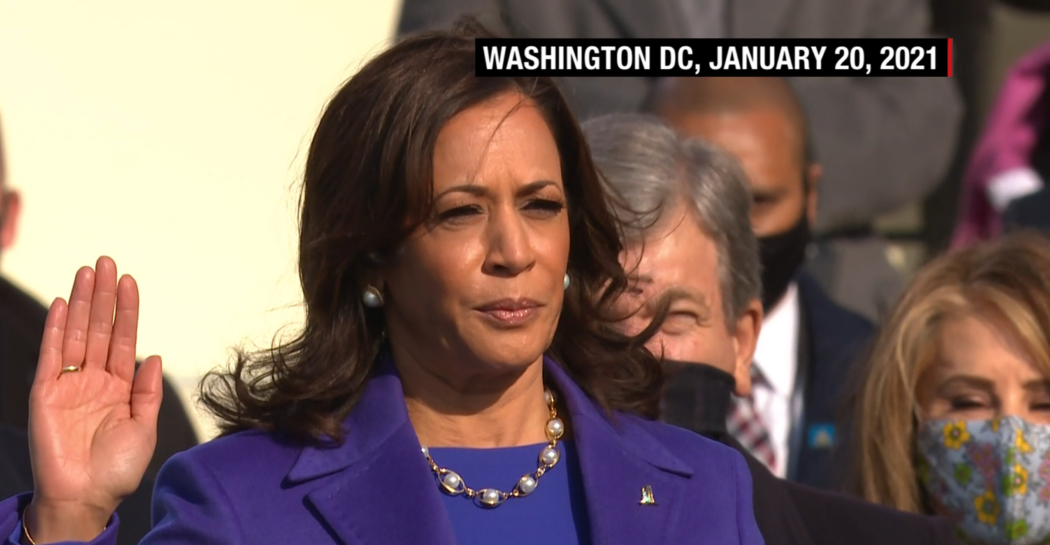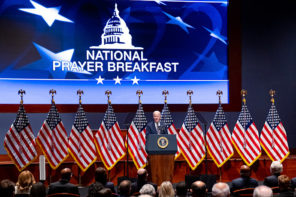C’mon, admit it: you had the Kleenex handy while you watched the swearing-in of the 46th president with all of the attendant ruffles and flourishes.
I certainly did. I doubt that any other presidential inauguration in any of our lifetimes has been as filled with the sense of answered prayer. And never before since the depths of the Great Depression and the Second World War has so much inauguration-related emotion been suffused with the experience of suffering. The grief we feel on January 20 flows not just from Covid’s awful toll but also from our anguish over the obvious fragility of American democracy and our nation’s ever-worsening structural injustices—appalling inequities that are too often euphemized as “disparities.”
I want to focus on suffering and the religious dimension. Just as soldiers once insisted that no one is an atheist in a foxhole, so too were there plenty of non-religious inauguration watchers who undoubtedly felt some of the spiritual weight in today’s ceremony.
There were plenty of reasons for feeling that weight while watching the pageantry unfold. There’s the symbolism, obviously: all those flags and bunting and glistening marble. And along with the symbols there’s continuity: the same oath being sworn by all U.S. presidents on the same day and at the same time, with the Marine Band playing some of the same “airs” it played for Thomas Jefferson in 1800.
Compared to royal coronations, American inaugurations are remarkably simple affairs. But our ceremonies retain their own majesty and are capable of projecting a strong sense that something sacred is happening.
Our inaugurations have always reflected a mashup of civil religion—invocations of our secular sacred texts, appeals to mystic chords of national memory—and bits of naked Christian expression. Fully secular democracies rightly dispense with things like invocations and benedictions; no hands are placed on Christian Bibles. Those who wince at these sectarian moments are right to wince, I think. And although Garth Brooks, a Republican, proved to be a gracious presence today, I dearly would like to see all explicitly Christian hymns (“Amazing Grace” included) retired from public events.
But leaving the Christian bits aside, the other and far more important civil religion elements—the oath-taking, the flags and bunting, the glorious band—seem to me indispensable. Retaining the proper setting at the Capitol’s West Front was especially indispensable this year because of what happened on January 6. In a very real and palpable sense, today’s ceremony amounted to the reconsecration of a sacred space that was profaned and defiled just two weeks ago—defiled not just by the rioters coming from outside but also by the 147 traitors inside the Capitol who violated their own oaths when they voted against the certification of a legitimate democratic election.
That this marble shrine to liberty and democracy was built by enslaved people and then polluted again and again by manifestations of an ugly white supremacy takes nothing away from the other moments when, we might say, the glory of the Lord was present there: e.g., when the likes of Abraham Lincoln and Franklin Roosevelt summoned our better angels, when the Reconstruction Amendments were drafted, and when the caskets of Rosa Parks and John Lewis lay in state under the soaring dome.
And again today, in a ceremony marked by both mourning and modesty; a ceremony in which white supremacy was explicitly repudiated multiple times, in which a dazzling young African-American poet set many hearts aflutter, and in which an extraordinary Black and Asian woman (with a Jewish husband to boot!) was sworn into the second-highest office in the land.
And Joe Biden? Our new president will never be eloquent, but today he showed us his heart. And I would say that his call for a moment of silence in honor of the Covid dead had an eloquence all its own.
Altogether a fitting beginning. The Latin root of “inauguration” harks back to Roman times and means “to consecrate by augury.” I’d say that today’s event augurs well for a new birth of decency. What we need is revolution, of course. But today I will settle for decency.





